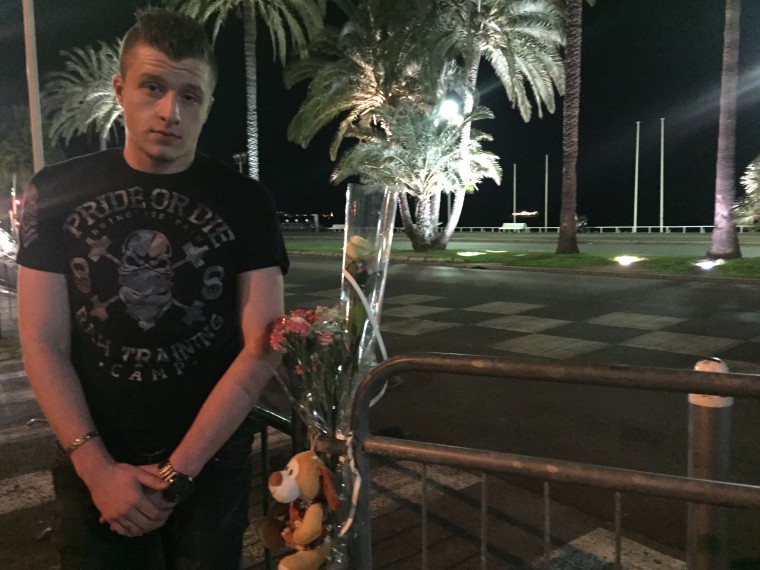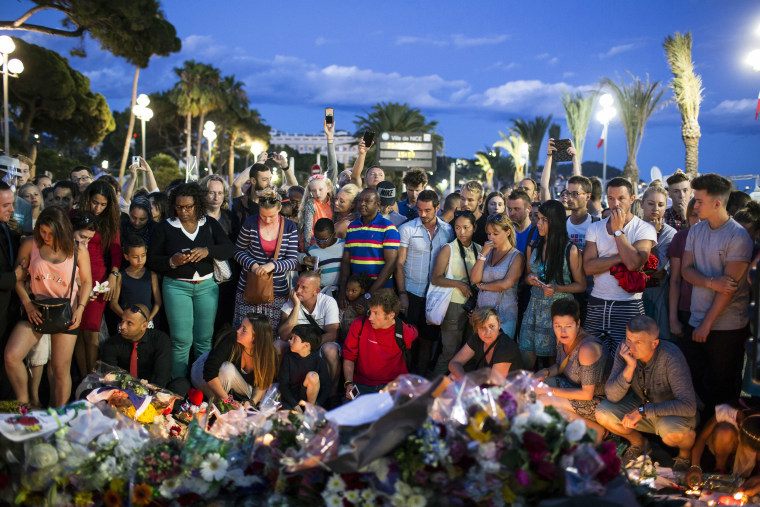NICE, France — Five people have been arrested over the Nice truck massacre, French prosecutors said Saturday amid grief and anger that authorities failed to thwart yet another mass attack in this already-grieving nation.
At least 84 people were killed and 200 injured when a truck driver used his vehicle as a weapon and cut a trail of terror through Bastille Day revelers after a fireworks display.
French President Francois Hollande called Thursday night's attack “undeniably terrorist in nature.” However, prosecutors said the driver, Mohamed Lahouaiej Bouhlel, wasn’t known to intelligence services.
Bouhlel, a 31-year-old Tunisian living in Nice, was known to police for “threats, violence and petty theft,” according to prosecutor Francois Molins. He was convicted in March and given a six-month suspended sentence for a road-rage incident involving a wooden pallet but was never on a watch list.
For reasons still unclear, Bouhlel climbed into a 19-ton white refrigerated truck and maneuvered it onto the packed Promenade des Anglais, hit the gas and sent bodies flying on a 1.2-mile rampage before he was shot dead by police.
French interior minister Bernard Cazeneuve said Saturday that, based on early investigations, Bouhel "appears to have become radicalized very quickly."
"Individuals who are sensitive to [ISIS'] message commit extremely violent actions, without necessarily having taken part in fighting, without necessarily having been trained," he told reporters after a government security meeting.
Flowers and tributes were left at barricades on the seafront Saturday as France observed three days of national mourning, the truck no longer in sight.
Clusters of police remained on the Promenade, watching over the scene and the crowds. Memorials to the victims grew by the minute. At one, a table was set up for people to write messages of solidarity.
"Our thoughts with Nice. Love from Liverpool, Baghdad and Syria," one man wrote on his sheet of white paper.
Not far down the promenade, friends Annie Trevelly and Valerie Mygardon stood at the barrier looking out at the sea next to two bouquets of flowers.
"What a tragedy," said Trevelly, 57. "Poor France, poor us."
"Poor France," Mygardon, 47, agreed.
The two friends live two blocks from where the truck was brought to a stop. Normally, they would have gone out for the fireworks but Mygardon had a headache.
Trevelly told NBC News that, from the apartment, she could hear people screaming “run, run.”
"It's unthinkable — unbelievable. It's just beyond belief," she said. "That someone could do this — drive this ... It's beyond belief."
As she spoke, her sadness turned to anger that police and security services had failed her city.
"There are specialists — they should have known," she gasped. "After what happened in Paris ... They should have done more to stop this!"
Mygardon, who appeared to be in shock, agreed. "They killed our children here — children," she said. "It pains us — this is a huge wound."
"People shouldn't have to become accustomed to attacks"
Their views were echoed by many in Nice on Saturday as the city slowly started trying to return to normal.
Tourists were back on the streets and beaches reopened.
The Promenade des Anglais, too, was open. Flowers marked bloodstains still visible on the pavement, a gut-wrenching reminder of the tragedy amid swirling questions.
How could the truck have gotten past security, how the driver was able to continue for so far before he was stopped? How did officials not prevent it?
The country was already reeling from Charlie Hebdo attacks in January 2015 and the Nov. 13 siege on Paris that left 130 dead. The terror spree in neighboring Belgium and a known threat to the recent Euro 2016 soccer tournament had authorities on high alert.
In the hours after the attack, Hollande extended the state of emergency he implemented in November and called up thousands of reservists — moves that many in Nice said was not enough.
The president's convoy was reportedly booed as it drove through the city, reflecting frustration and anger over his perceived failure to address the threat of terrorism.
Regional council president Christian Estrosi wrote an open letter in the Nice Matin newspaper, calling France's current leadership "incapable" and saying his call for security to be reinforced ahead of the fireworks display had been rebuffed.
Opposition politician and former prime minister Alain Juppe told RTL radio that not enough had been changed in wake of the Paris attacks. “If all measures had been taken, the tragedy ... would not have happened," said Juppe, according to the AFP news agency.
Rodolphe Auvergne, 18, could not agree more. Riding his bike down the Nice promenade just after 2 a.m. local time, he stopped to read a note pinned to the barricades with flowers.
The teen lives in Paris but is vacationing in Nice and saw panicked crowds fleeing the carnage.

“It was hard — especially after the Bataclan,” he said, referring to the nightclub in Paris where dozens were killed in November. “I think France is turning to a bad direction.”
He called for more security measures, accusing French officials of paying only lip service to the problem. “It didn't stop. It's not doing anything,” he said. “The government isn’t doing enough.”
Auvergne told NBC News that he has been scared to ride the metro since the Paris attacks.
“Charlie Hebdo, Bataclan, now Nice. Where will the next attack be? We are not secure ... we live in fear,” he said passionately. “I don't think it's right for people to live like this ... People shouldn’t have to become accustomed to attacks. They need to make changes, and fast.”
